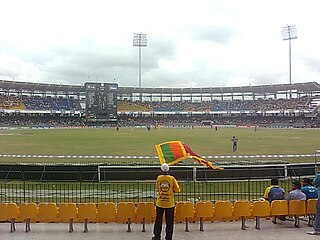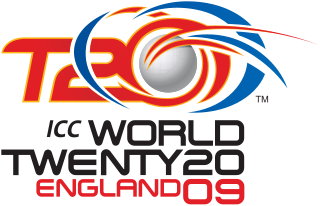
The 1996 Cricket World Cup, also called the Wills World Cup 1996 after its official sponsors, ITC's Wills brand, was the sixth Cricket World Cup organised by the International Cricket Council (ICC). It was the second World Cup to be hosted by Pakistan and India, and for the first time by Sri Lanka. The tournament was won by Sri Lanka, who defeated Australia by seven wickets in the final on 17 March 1996 at the Gaddafi Stadium in Lahore, Pakistan.

The R. Premadasa International Cricket Stadium(RPS) is a cricket stadium on Khettarama Road, Maligawatta, Colombo, Sri Lanka. The stadium was, before June 1994, known as the Khettarama Cricket Stadium and is today one of the main venues where the Sri Lankan cricket team play, having hosted more than 100 one day international matches. It is the largest stadium in Sri Lanka with a capacity of 50000 spectators. It has hosted the 2012 ICC World Twenty20 finals between Sri Lanka and West Indies, 2002 ICC Champions Trophy finals between Sri Lanka and India and first semi final of the 2011 ICC Cricket World Cup between Sri Lanka and New Zealand. This was where the highest Test score in the history was recorded; 952 by Sri Lanka against India. With capacity exceeding The Lord's stadium in England, the stadium is known as the "home of Sri Lankan cricket".

The 2009 ICC World Twenty20 was an international Twenty20 cricket tournament which took place in England in June 2009. It was the second ICC World Twenty20 tournament, following the inaugural event in South Africa in September 2007. As before, the tournament featured 12 male teams – nine of the ten Test-playing nations and three associate nations, which earned their places through a qualification tournament. Matches were played at three English grounds – Lord's and The Oval in London, and Trent Bridge in Nottingham. The tournament was organised in parallel with the women's tournament, with the men's semi-finals and final being preceded by the semi-finals and final from the women's event. The final took place at Lord's on Sunday 21 June with Pakistan beating Sri Lanka by eight wickets and England beating New Zealand by six wickets in the women's final.
The Sri Lankan cricket team toured South Africa during the 1997–98 season, playing two Tests from 19 to 30 March 1998. Prior to the series, Sri Lanka had toured South Africa in the 1994–95 season, playing only One Day Internationals in the Mandela Trophy. This was therefore the first Test series between the two in South Africa.
The Sri Lankan cricket team toured South Africa during the 2000–01 season, playing three Tests and six one-day internationals.
At the end of each ICC Cricket World Cup final tournament, several awards are presented to the players and teams which have distinguished themselves in various aspects of the game.
The Sri Lanka national cricket team toured England in the 1998 season. On the tour they played 4 first-class matches, 5 List A matches and a single Test match. They also competed in a tri-series tournament against England and South Africa, entitled the Emirates Triangular Tournament. They won the competition by defeating England in the final, also beating South Africa in the group stage. They won the only Test, with Muttiah Muralitharan taking a career best 16/220 – the 5th best bowling figures in a match in Test cricket history.
The Super Eight stage of the 2007 Cricket World Cup was scheduled between 27 March 2007 and 21 April 2007, and determined the four qualifiers for the semi-finals of the tournament. Matches were held in Antigua, Bridgetown in Barbados, Georgetown in Guyana, and Grenada.
The Cherry Blossom Sharjah Cup was a One Day International cricket tournament held in Sharjah during April 2003. The games took place at Sharjah Cricket Association Stadium. Seven matches were played during the tournament, including the final. Final of the tournament was played between Pakistan and Zimbabwe which Pakistan won by eight wickets. After scoring two centuries, Kumar Sangakkara was named the man of the series. It was Sanath Jayasuriya's last tournament as Sri Lankan captain.
The Mandela Trophy was a one-day International cricket tournament which took place from 2 December 1994 to 12 January 1995. The tournament was hosted by South Africa, who were one of the four sides competing, with the others being New Zealand, Pakistan and Sri Lanka. Each side played each other twice before the two with the most points took part in a best of three finals series. The finals were contested between Pakistan and South Africa with the hosts winning 2–0.

The 2010 ICC World Twenty20 was the third ICC World Twenty20 competition, an international Twenty20 cricket tournament that was held in the West Indies between 30 April and 16 May 2010. It was won by England, who defeated Australia in the final. Kevin Pietersen was named as player of the tournament.

The 2010 ICC Under-19 Cricket World Cup was the eighth edition of the Under-19 Cricket World Cup and took place in New Zealand. Since 1998, the tournament has been held every 2 years. This edition had 16 teams competing in 44 matches between 15 and 30 January 2010. These included the 10 ICC Full Members and 6 Qualifiers. The tournament was originally scheduled to take place in Kenya, but the International Cricket Council (ICC) moved it to New Zealand after an inspection in June 2009 found that it would be unrealistic to expect Kenya to complete preparations in time.
The Tri-Series in Bangladesh in 2009–10 was a One Day International cricket tournament for the Idea Cup which was held in Bangladesh from 4 January to 13 January 2010. The tournament involved the national teams of India, Sri Lanka and Bangladesh. The tournament was won by Sri Lanka who defeated India in the final match which was held on 13 January 2010.
The 1996 Singer Cup was a triangular cricket tournament held between 1 and 7 April 1996 in Singapore. The competition featured the national cricket teams of India, Sri Lanka and Pakistan. The tournament was won by Pakistan, which defeated Sri Lanka in the final on 7 April.
The 1997 Pepsi Independence Cup was a quadrangular ODI cricket tournament held in May 1997 to commemorate the 50th anniversary of the independence of India. It featured the national cricket teams of New Zealand, Pakistan, Sri Lanka and the hosts India. The tournament was won by Sri Lanka, which defeated Pakistan in the best-of-three finals.

The 2014 Asia Cup was the twelfth edition of the Asia Cup cricket tournament. The tournament was held in Bangladesh from 25 February to 8 March 2014. Pakistan were the defending champions, having won the previous tournament. The tournament included the four Asian test-playing nations, Bangladesh, India, Pakistan and Sri Lanka; and ICC Asian Associate member Afghanistan. This was the first 50-over tournament in which Afghanistan took part. Ten league matches were played along with the final. The title sponsors of the tournament were Arise India and it was powered by Cycle Agarbathis. Sri Lanka Beat Pakistan in the final to become Asia Cup champions for the fifth time.

The 2013 ICC Champions Trophy was the seventh ICC Champions Trophy, a One Day International cricket tournament held in England and Wales between 6 and 23 June 2013. Three cities hosted the tournament's matches: London, Birmingham and Cardiff.
The History of the Sri Lanka national cricket team began with the formation of the Colombo Cricket Club in 1832. By the 1880s a national team, the Ceylon national cricket team, was formed which began playing first-class cricket by the 1920s. The Ceylon national cricket team had achieved associate member status of the International Cricket Council in 1965. Renamed Sri Lanka in 1972, the national team first competed in top level international cricket in 1975, when they played against West Indies during 1975 Cricket World Cup; West Indies won the match by 9 wickets at Old Trafford, Manchester, England.
The 2001 Khaleej Times Trophy was a One Day International (ODI) cricket tournament held in the United Arab Emirates in late October 2001. It was a tri-nation series between the national representative cricket teams of the Pakistan, Sri Lanka and Zimbabwe. The Pakistanis won the tournament by defeating the Sri Lanka by 5 wickets in the final. All matches were held in Sharjah Cricket Stadium, Sharjah.
The Standard Bank International Series was the name of the One Day International cricket tournament in South Africa for the 1997-98 season. It was a tri-nation series between South Africa, Pakistan and Sri Lanka.






